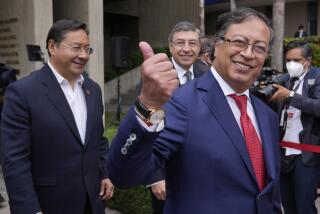Colombian Guerrillas Sound Off
- Share via
BOGOTA, Colombia — In a bit of high political drama, a handful of Colombia’s presidential candidates faced off Thursday with the nation’s largest rebel group as part of an ongoing effort to rescue the country’s peace process.
The meeting marked the first time that guerrillas from the leftist Revolutionary Armed Forces of Colombia, or FARC, were given a nationally televised platform to explain their goals and hopes for the process.
They took full advantage of the opportunity, using double their allotted 15 minutes and launching into a screed against “Yankee” interference and neoliberal economic policies that showed the yawning gulf that separates the rebels from the government.
“We must change the neoliberal polices of this government,” said FARC negotiator Simon Trinidad, who met with the candidates and government negotiators in a special demilitarized zone created three years ago for peace talks. “They have resulted in the worst economy in the history of this country.”
Beyond the charged rhetoric, the meeting also represented a high-stakes gamble by the candidates, who face a first round of voting in May.
The peace process has become increasingly unpopular in the last few months as the guerrillas have gone on a rampage, downing electrical towers and attacking police and army barracks and, in one case, the water supply for Bogota, the capital.
The result has been a huge increase in support for one of the most conservative candidates in the race, Alvaro Uribe Velez, a tough-talking former governor who has promised to do away with the demilitarized zone unless the government wins more concessions from the rebels.
In recent polls, Uribe has advanced from third place to first, winning 53% support in a poll released Thursday--a percentage high enough to allow him to win the presidency outright May 26. The margin of error was 2 percentage points.
Uribe skipped the meeting Thursday with the guerrillas, who have allegedly tried to assassinate him three times, including once with a bomb strapped to a mule. Several other candidates also avoided the encounter.
But Liberal Party candidate Horacio Serpa, who led in earlier polls and is the candidate most closely identified with the peace process, did show up.
Serpa sharply confronted the guerrillas, scolding them for failing to prove their desire for peace. He walked a fine line, talking tough but continuing to portray himself as the candidate for peace.
But as the rebels and the government negotiators presented their demands to the nation, the difference between the two positions became clear.
The guerrillas laid down a series of conditions to arrive at a cease-fire before April 7, the deadline imposed by President Andres Pastrana to invade the zone.
Among other things, the list includes an end to “Plan Colombia,” the U.S.-backed program to halve Colombia’s cocaine production, and a halt to the extradition of narco-traffickers to the United States.
They also demanded the immediate creation of a massive unemployment benefit to provide money to the millions of jobless Colombians, a program they estimated would cost $4 billion a year--or about 5% of the country’s gross domestic product.
For its part, the government demanded an end to the rebels’ kidnapping and the release of all captives. It also insisted that the guerrillas stop destroying infrastructure, laying mines and attacking civilians.
More to Read
Sign up for Essential California
The most important California stories and recommendations in your inbox every morning.
You may occasionally receive promotional content from the Los Angeles Times.













